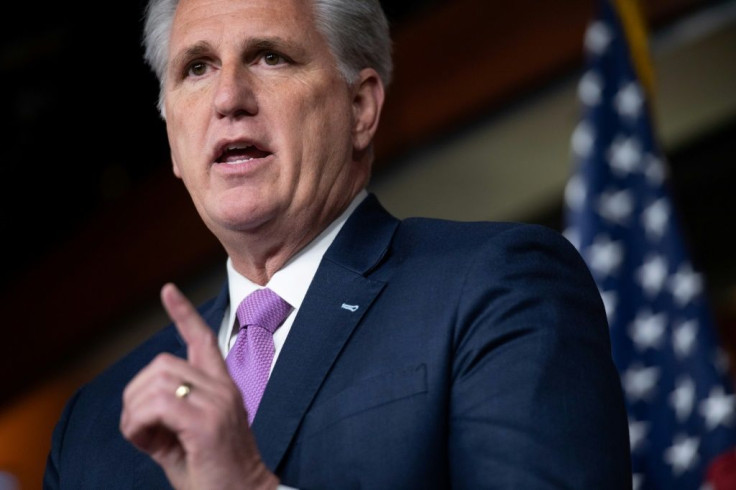Trump Impeachment Reaction: White House Says President 'Did Nothing Wrong,' While Many On Twitter Call For Removal

Republicans predictably denounced articles of impeachment lodged against President Trump Tuesday, condemning Democrats for the speed with which they conducted their investigation and drafted the charges.
House Judiciary Committee Jerrold Nadler outlined the accusations at a press conference, citing Trump for abuse of power and obstruction of Congress, and declaring, “No one, not even a president, is above the law.”
Trump took immediate umbrage on Twitter.
Early in the investigation, Trump and Republicans complained the president was not afforded an opportunity to defend himself but then the White House turned down a Judiciary Committee invitation to participate in the two hearings it held before drafting the articles of impeachment.
Vice President Mike Pence called the action in Washington “a disgrace.”
.@VP Mike Pence: "What's happening in Washington, DC today is a disgrace." pic.twitter.com/NHqsKiDuZW
— The Hill (@thehill) December 10, 2019
Hours before Nadler announced the articles of impeachment, a small group of Democrats reportedly floated the idea of censuring him instead. The Democrats looking for an alternative all represent districts Trump won in 2016 and met late Monday to find a way to punish the president without having to vote on impeachment.
The full House could vote as early as next week. A trial would take place in the Republican-controlled Senate.
White House Press Secretary Stephanie Grisham accused Democrats of having always wanted to impeach the president and said he will address the charges in a Senate trial.
"The President will address these false charges in the Senate and expects to be fully exonerated because he did nothing wrong," she said.
Deputy press secretary Hogan Gidley told reporters the president wants a Senate trial “sooner rather than later,” adding the process “has to be fair.”
Trump said last month he would consider testifying and Gidley did not rule out the possibility.
Rep. Steve Scalise, R-La., called the Democrats’ decision “a low mark in Congress.”
Rep @SteveScalise: "It's going to be a low mark in congress, when you see what they've done to the standard of impeachment." pic.twitter.com/9LY0KH8Nuo
— The Hill (@thehill) December 10, 2019
House GOP Leader Kevin McCarthy said Democrats are trying to overturn the 2016 election.
.@GOPLeader: "Back in 2016, the Democrats called those who supported Donald Trump 'deplorables' and now they're trying to disqualify their votes." pic.twitter.com/1rd6BjL2zR
— The Hill (@thehill) December 10, 2019
Twitter users called for Trump's removal from office.
@GOP I beg you, when it comes time to vote to #RemoveTrump, please prove you will put country over party. He is the worst president we've ever had, and we haven't been this divided in a long time. Please just admit he's a failure and help us get the country back to normal. 😔
— Nikkie_42 (@42Nikkie) December 10, 2019
Obstruction of Congress + Abuse of Power = DEADLY concoction for #TrumpImpeachment because NOBODY is above the law #RemoveTrump #ArticlesOfImpeachment ❌❌❌
— Jada (@jadarosee2019) December 10, 2019
“Never Again” should be America’s bipartisan slogan. This guy is a public embarrassment and a threat to our National Security and the Constitution. #ImpeachAndConvictTrump #RemoveTrump
— Ted Jones PA, ASCAP Poet. (@TedTedd400) December 10, 2019
And Republicans won't be safe if they vote against impeachment.
Declaring that the committee was charging Trump with “high crimes and misdemeanors,” Nadler continued: “It is an impeachable offense for the president to exercise the powers of his public office to obtain an improper personal benefit while ignoring or injuring the national interest. That is exactly what President Trump did when he solicited and pressured Ukraine to interfere in our 2020 presidential election, thus damaging our national security and undermining the integrity of the next election and violating his oath to the American people.”
At issue time, is Trump’s effort to get Ukraine to investigate former Vice President Joe Biden, Biden’s son, Hunter, who held a position on the board of a Ukrainian energy company, and a debunked theory that Ukraine, not Russia, interfered in the 2016 election, what one witness described as a “fictional narrative” promoted by Moscow. Testimony indicated it was understood Trump was holding up $391 million in military aid in exchange for the investigations.
As the House Intelligence, Oversight and Foreign Affairs committees attempted to investigate Trump’s actions, the president directed administration officials not to cooperate by refusing to testify and declining to turn over subpoenaed documents, leading to the second article of impeachment, obstruction of Congress.
“A president who declares himself above accountability above the American people and above Congress’ power of impeachment, which is meant to protect against threats to our democratic institutions, is a president who sees himself above the law. We must be clear: No one, not even a president is above the law,” Nadler said.
The Judiciary Committee steered clear of obstruction of justice charges based on the special counsel’s investigation of the 2016 Russian election interference.
© Copyright IBTimes 2024. All rights reserved.






















